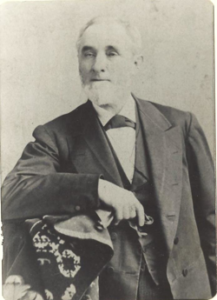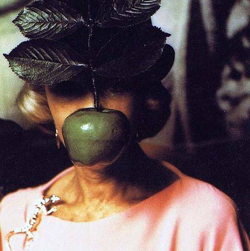Published September 1, 2024
Taylor Swift’s muse has Hoosier roots
 As most Taylor Swift fans know, each of her albums has a plethora of Easter eggs woven throughout the lyrics — and her surprise 2020 album, “folklore,” is no exception. But even the most passionate Swifties may not know about one of the album’s biggest secrets: “the last great american dynasty” has ties to Indiana. Let’s follow the “invisible string” connecting the legendary Rebekah Harkness to Culbertson Mansion State Historic Site.
As most Taylor Swift fans know, each of her albums has a plethora of Easter eggs woven throughout the lyrics — and her surprise 2020 album, “folklore,” is no exception. But even the most passionate Swifties may not know about one of the album’s biggest secrets: “the last great american dynasty” has ties to Indiana. Let’s follow the “invisible string” connecting the legendary Rebekah Harkness to Culbertson Mansion State Historic Site.
The third track of “folklore” shares a story about a 20th-century socialite: Rebekah Harkness (pictured right), one of the wealthiest women in the United States in the 1950s and the previous owner of Swift’s home in Rhode Island.
 Harkness was also the great-granddaughter of the once-richest man in Indiana, William Stuart Culbertson (pictured left). A Hoosier businessman who sold dry goods, started his own utility company and invested in the Kentucky-Indiana Railroad Bridge Company, Culbertson built the 20,000-square-foot mansion in New Albany during the late 1800s. Today, it is one of the 12 locations in the Indiana State Museum and Historic Sites system.
Harkness was also the great-granddaughter of the once-richest man in Indiana, William Stuart Culbertson (pictured left). A Hoosier businessman who sold dry goods, started his own utility company and invested in the Kentucky-Indiana Railroad Bridge Company, Culbertson built the 20,000-square-foot mansion in New Albany during the late 1800s. Today, it is one of the 12 locations in the Indiana State Museum and Historic Sites system.
Culbertson and his first wife, Eliza, had a daughter named Anna. Anna married Frank Semple, of Minneapolis, Minn. Anna and Frank had a daughter, Rebekah Cook Semple, in 1885. Years later, Rebekah married Allen Tarwater West, of St. Louis, Mo., Rebekah and Allen had a daughter, Rebekah Semple West, in 1915.
After Rebekah married and divorced her first husband, Charles Dickson Pierce, she married Standard Oil heir William “Bill” Harkness in 1947.
The Harknesses bought a Rhode Island home they called Holiday House. Rebekah Harkness owned the house for the rest of her storied life, until her death in 1982. Swift purchased Holiday House 31 years later for $17 million.
If the walls of that house could talk, they would share a similar account of Harkness’ life to that in Swift’s song.
Harkness’ New York Times obituary noted she was a philanthropist like her great-grandfather, an artist, a patron of dance and a supporter of medical research. Of course, the Culbertson descendant’s story stretches well beyond what was included in her obituary, and more details of Harkness’ life are revealed in “the last great american dynasty.”
Swift’s song begins with Harkness taking a train to Holiday House, where she and her husband were known to throw parties attended by well-known stars. Lyrics also give a nod to Harkness filling the pool with champagne, alluding to reports she cleaned her pool with champagne.
The song also mentions Harkness spending quite a lot of her deceased husband’s money “on the boys and the ballet.” She did have a deep love for the dance, which she demonstrated both personally and financially.
According to articles about Harkness that are kept at the Culbertson Mansion, she did spend quite a bit of money on the ballet. She even began her own dance company — Harkness Ballet — in March 1964.
One article mentions she began daily ballet lessons when she formed her company to be more involved than “sitting back and writing out checks.”
The Harkness Foundation for Dance still exists today.
 Swift also alludes to Harkness’ friendship with Surrealist artist Salvador Dali. It’s a connection the Culbertson Mansion State Historic Site highlighted at their Surrealist Ball event in 2019.
Swift also alludes to Harkness’ friendship with Surrealist artist Salvador Dali. It’s a connection the Culbertson Mansion State Historic Site highlighted at their Surrealist Ball event in 2019.
Harkness was among those in attendance during the 1972 Surrealist Ball in France (pictured left), which was hosted in honor of Dali by Baroness Marie-Hélène de Rothschild and her husband, Guy, at the Chateau de Ferrières.
Although we aren’t sure about her “losing on card game bets with Dali” as Swift’s lyrics suggest, articles from family files at the Culbertson Mansion do mention Salvador often joined Harkness’ entourage and sold her thousands of dollars’ worth of jewelry.
By the end of the song, Swift brings the story of the two Rhode Island homeowners full circle. While she calls Harkness “the maddest woman this town has ever seen” and says “she had a marvelous time ruining everything,” Swift calls herself “the loudest woman this town has ever seen” and — just like Harkness — she’s having “a marvelous time ruining everything.”









